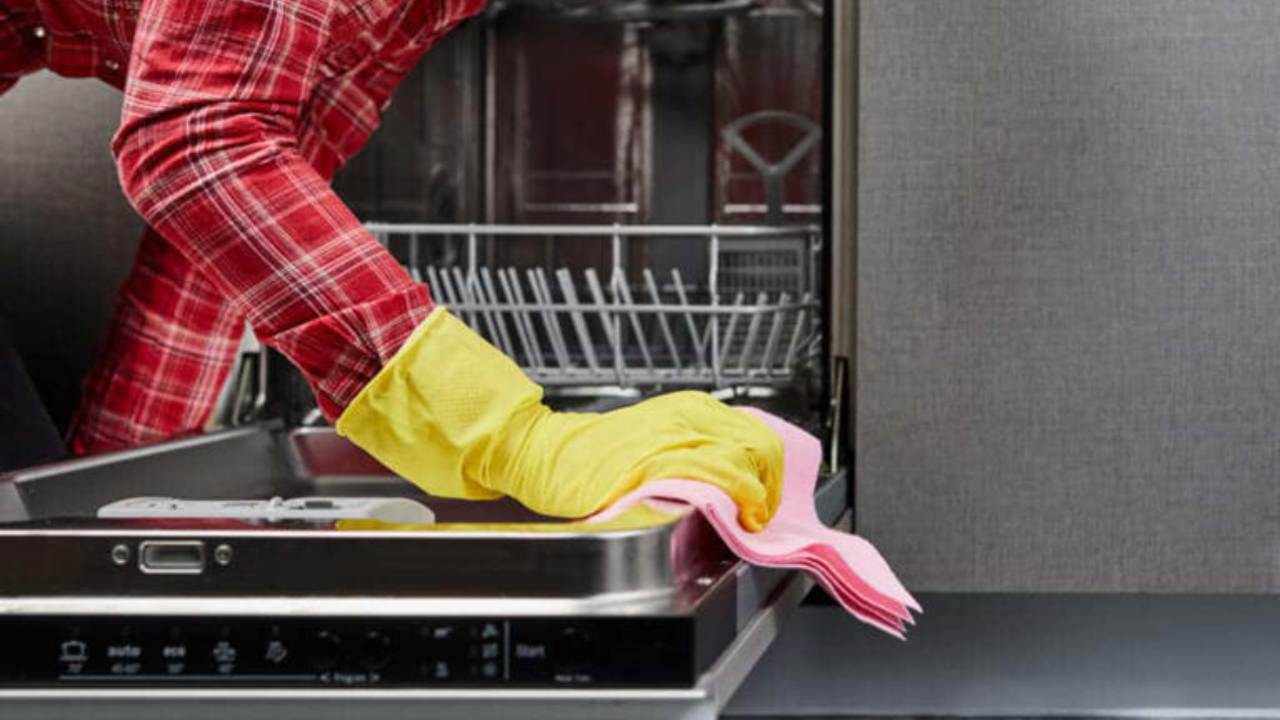How to Clean a Dishwasher to Reduce Smells & Dirt?
It is effortless to keep your dishwasher fresh; regular cleaning prevents odors, mineral and detergent accumulation, and clean dishes. However much you use cleaning tablets or natural products such as vinegar and baking soda, consider doing the following to keep your tank at its optimum performance and hygiene level monthly.
You could redo these cleaning procedures after 1 to 2 months. In case you run your dishwasher, a lot or start smelling odors earlier than usual, clean it more often. Maintenance keeps building up to a minimum and performance is high. In order to get to know detailed, efficient methods to get rid of odors and filth out of your dishwashing machine, Appliance Repair Dubai gives a direct and helpful clarification.
Effective Ways to Deep-Clean Your Dishwasher—and Why It’s Important
Although a dishwasher appears to clean itself, the fine detail is that grease, soap residues, and food particles accumulate over time and deposits build up inside. A recent study by NSF International revealed that 62% of dishwashers may pose a risk of E. coli contamination and Salmonella bacteria when they are not regularly cleaned.
This accumulation is unpleasant as well as can shrink your dishwasher machine’s cleaning capabilities by 20%, wasting energy and increasing water use. Here is a step-by-step professional guide on how to deep clean your dishwasher as supported by real-time data to assist you in maintaining a machine that is fresh and efficient.
Dishwasher Cleaning Process to Reduce Smells & Dirt
Keeping your dishwasher clean not only prevents bad odors but also ensures it runs efficiently. Grease, soap residue, and food particles can accumulate inside, leading to bad odors and potentially reducing your dishwasher’s efficiency. Follow these steps for thorough cleaning:
1. Clear Out Any Food Debris (5 Minutes)
- Take out the lower rack to reach the drain section.
- Wipe away visible food particles or residue using a paper towel or soft cloth.
- Check for utensils or small objects that may have fallen into the filter area.
Fact: A clogged dishwasher drain can cause standing water, leading to bacterial growth rates up to 10x faster than in a dry environment.
2. Clean or Replace the Filter (10 Minutes)
- Locate the filter (usually under the bottom spray arm).
- Twist and remove the filter assembly.
- Clean it under warm running water with mild dish soap and a soft brush to scrub away grease and food buildup.
- If the filter is damaged, replace it—a clogged or broken filter can cause odors and poor drainage.
Tip: Specialists suggest cleaning the filter every 2–4 weeks for peak efficiency. Keeping it clean can also reduce your dishwasher’s water use by up to 15%.
3. Wipe the Interior Walls & Door (10 Minutes)
- Use a damp microfiber cloth with warm, soapy water to clean the inner door, sidewalls, and rubber gasket.
- Focus on cleaning the door edges and the area around the detergent dispenser, as these spots tend to accumulate grime.
- Refrain from utilizing strong chemicals that could harm the finish.
Fact: Mold spores can grow inside a damp dishwasher gasket in just 48 hours if not cleaned and dried regularly.
4. Run a Hot Vinegar Wash Cycle (15 Minutes)
- Put a bowl or cup that is safe for the dishwasher on the top rack, and fill it with 1 cup of white vinegar.
- Start a hot water cycle without adding any detergent.
- Vinegar dissolves mineral deposits, grease, and kills up to 99% of odor-causing bacteria.
5. Run a Baking Soda Rinse (Optional but Effective)
- Once the vinegar cycle is complete, add 1 cup of baking soda to the base of the dishwasher.
- Run a short hot cycle to freshen and brighten the interior.
- Baking soda absorbs lingering odors and adds extra cleaning power.
Why it works: Baking soda is a natural deodorizer and mild abrasive, removing stains without scratching surfaces.
6. Clean the Spray Arms
- Remove the upper and lower spray arms if possible.
- Rinse under running water to clear any clogged holes.
- Use a toothpick or a fine brush to clear any food debris lodged in the spray arm holes.
Fact: Clogged spray arms can reduce cleaning coverage by up to 40%, meaning dishes won’t come out fully clean.
7. Wipe the Exterior
Don’t forget to clean the control panel and handle it with a soft, damp cloth. For stainless steel surfaces, wipe with a specialized stainless steel cleaner or a diluted vinegar solution to eliminate fingerprints and restore shine.
8. Leave the Door Open to Air Dry
Once cleaned, keep the door ajar to allow airflow, preventing trapped moisture and reducing the chance of odors developing. Regular airflow helps keep the dishwasher fresh.
Why Regular Cleaning Can’t Be Overlooked?
- Odor & Grime Protection: Dishwashers may end up with remains of food, grease, minerals, etc., and some detergent, forming poor-smelling, waste-generating systems and low performance.
- Expert-Recommended Frequency: Cleaning: cleaning the machine is recommended after every 4 to 6 weeks by cleaning experts to maintain a fresh and efficient machine.
- Prevent Repairs: Compressing buildup into filters and drains will lead to unsatisfying cleaning output and expensive repairs involving less than half of dishwasher repair service calls may have been prevented by timely upkeep.
- Health & Safety considerations: Dirty filters not only have an impact on the cleaning process but may also contain bacteria and mold and even provide pests with an opportunity to enter.
Step-by-Step Monthly Deep Clean Routine
- Remove & Wash the Filter: Clean filters monthly (or sooner in heavy-use settings) to avoid buildup, smelly odors, and performance setbacks.
- Clean Spray Arms Every 2–3 Months: Ensures water jets flow freely; clogged arms reduce cleaning efficiency and create odor traps.
- Wipe Seals, Tub & Door Edges Weekly: Prevents mold and grime from building up in hard-to-see spots.
- Monthly Deep Cycle with Vinegar + Baking Soda: Run a hot cycle with a cup of white vinegar, followed by a short cycle with baking soda to deodorize and refresh your machine.
- Use a Store-Bought Dishwasher Cleaner Monthly: Products like finish or afresh target limescale and grease—preferred by many appliance experts.
- Clean the Drain & Check Every Few Months: A clogged drain impairs function—ensure thorough cleaning and prevent future issues.
Energy Impact: A clean dishwasher can save up to 10 kWh of energy per month and reduce water use by up to 500 liters annually compared to a clogged or dirty one.
Enhanced Tips for a Cleaner, Healthier Kitchen
- Don’t Pre-Rinse on High-Use Days: Scraping the additional food before loading should be done but not rinsing; this will make the dishwasher work better.
- Use Rinse-Only Cycle When Not Used in Full: It does not allow the presence of leftover food when not regularly used.
- Sanitize Post-Illness or Raw Food Exposure: Run bleach or major heat sanitize cycles, to kill off pathogens those excellent post-contamination purges.
- Increase Frequency in Hard Water Service Areas: Scaling in water may be faster in areas where the water is hard and it is only necessary to clean monthly even more.
Looking for Expert Dishwasher Cleaning or Appliance Repairs?
Appliance Repair Dubai is a team of professional repair technicians offering quality and efficient appliance maintenance and repair services for all major household appliances ranging in the UAE, such as Dubai, Sharjah, Abu Dhabi, and its vicinities. Have the chance to receive a quick, reliable, and reasonably priced service that allows your appliances to run smoothly. Contact us now!
Final Takeaway
Cleaning Dishwashers Every day has a generic meaning: for hygienic operation, for the longer life of the appliances, and efficiency without odor. Clean it from time to time, run a cycle with the vinegar or baking soda, and wipe down non-floored areas, and often remove food debris and clean filters from the dishwasher unit.
This can be done monthly or, if there are heavy and severe uses or hard water areas, more often. Thus, you guarantee sparkling dishes, fewer repair needs, and a healthier kitchen environment. Continuous maintenance boosts cleaning efficacy in terms of saving time and money with a longer life expectancy of your dishwasher.

